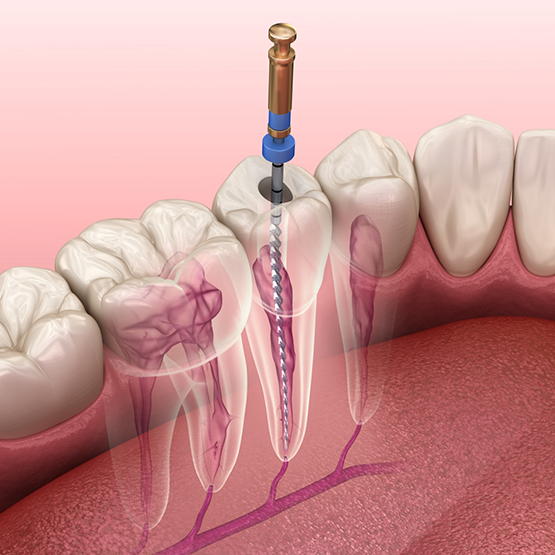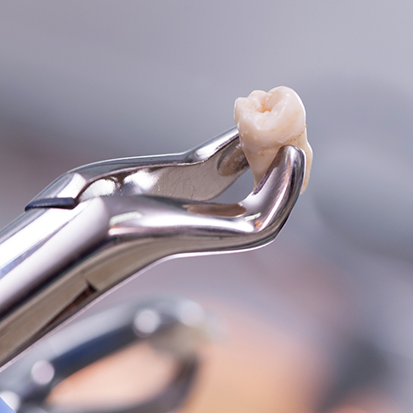Root Canal Treatment Granby
Relieve Tooth Pain & Save Teeth

Like many, you might cringe at the mere mention of a root canal. However, did you know this procedure actually saves teeth from needing to be pulled? It’s true. Without root canal treatment in Granby, many more patients would be missing teeth or suffer severe tooth pain. Therefore, you can count on our dentists at Salmon Brook Dental to ensure you have a comfortable and effective treatment — one that relieves your pain and preserves your natural tooth!
Why Choose Salmon Brook Dental for Root Canal Treatment?
- CEREC Same-Day Crowns Available
- Dental Insurance Accepted & Maximized
- Gentle, Skilled Team of Dentists
Do I Need a Root Canal?

A root canal addresses an infected or abscessed tooth. As such, you may need one if you show signs of bacteria infecting your teeth. Such symptoms can include:
- Persistent Tooth Pain – If you have a severe toothache that lasts more than a day, your tooth might be infected.
- Sensitivity to Heat & Cold – A tooth hurting from something hot or cold can mean its blood vessels and nerves are infected.
- Swollen Gums – Gums swelling near a pained tooth can signal the need for a root canal.
- Chip or Crack in the Tooth – Bacteria can inflame and infect a tooth if it’s chipped or cracked.
- Tooth Mobility – An infected tooth may feel looser due to nerve death.
Should you show any of the signs above, go ahead and book a visit with our office. That way, we can perform an oral exam and see whether root canal therapy is right for you.
The Root Canal Treatment Process

A root canal removes infected tooth pulp from your mouth. To that end, it relies on several steps.
First, our dentists will numb your mouth using local anesthesia before treatment starts. Doing so ensures you won’t feel any pain from the therapy.
Next, the team will use special tools to remove your tooth’s pulp. Though this process does create a space in your pearly white, don’t worry. The area will be given a filling that rebuilds tooth structure and shape.
Once we’ve cleaned and sealed your tooth’s inner chamber, we’ll create and place your dental crown.
Using CEREC technology, this step should only take an hour or so. You thus won’t need to return for an extra visit!
The Benefits of Getting a Root Canal

Contrary to rumors, a root canal is a highly beneficial procedure. Its most common perks are:
- Tooth Preservation – A root canal lets you keep the affected tooth. That’s a much better outcome for your health and budget, as extraction treatments affect your mouth negatively and prove costly.
- Tooth Protection – By caring for the crown placed after a root canal, you’ll prevent further tooth damage.
- Pain Relief - Root canal treatment removes the infected nerves causing you pain and discomfort.
- Lifelike Results – In most cases, the results of root canal therapy aren’t noticeable. The crown placed after treatment doesn’t highlight damage.
Understanding the Cost of Root Canals

The cost of root canal treatment can be difficult to pinpoint without a consultation. After all, there are several factors that go into the price, including the location and type of tooth that needs to be treated. With all of that said, our Granby dental team will go above and beyond to make the financial side of your care stress-free. Until then, you can read on to learn more about the cost of this tooth-saving treatment.
Factors That Can Affect Root Canal Cost

We mentioned in the first section that the location and type of tooth need to be considered in order to provide you with an estimate of the cost. Of course, these are only two of the many factors. We also need to assess the complexity of the case, the type of restoration needed to restore your tooth, if you have dental insurance, and more! Don’t worry – we will review all of this and more during your appointment so you are fully informed of everything regarding the cost.
Is it Cheaper to Pull My Tooth?

Many patients assume that it’s often cheaper to have their tooth extracted. The reality is that’s usually not the case. After all, you need to factor in the price of having your tooth pulled as well as the dental bridge or implant that’s going to replace it. Root canal treatment, on the other hand, is only one procedure. It also can effectively eliminate the infection, saving your tooth and restoring your bite in the process. Again, if you have any questions about the price of the treatment (or why we recommend it over others), you’re more than welcome to ask our knowledgeable dental team.
Does Dental Insurance Cover Root Canal Treatment?

Sometimes, yes! In fact, your provider may cover anywhere from 40% to 80% of the cost. Ultimately, it depends on the fine print on your plan, including if you have any waiting periods, annual maximums, or yearly deductibles. We know that dealing with dental insurance can be overwhelming, which is why we are happy to help our patients navigate the ins and outs of their coverage. We welcome many of the nation’s leading providers, including Aetna, Cigna, Delta Dental, and Guardian, so don’t hesitate to let us know if you need any assistance understanding your benefits.
Other Options for Making Root Canal Treatment Affordable

If you don’t currently have dental insurance, don’t let that stop you from getting the necessary restorative or emergency care you need. We offer our patients two additional financial solutions: our periodic special offers and flexible financing through CareCredit. As a result, the cost of root canal treatment can fit into nearly any budget! If you would like further details, please give our Granby dental team a call so we can help.
Root Canal FAQs
How much pain is normal after a root canal?
As you might have gathered, you can expect the root canal procedure itself to be completely painless. However, it’s common for patients to experience a little bit of discomfort in the days after their root canal procedure.
This should be mild and temporary, fading quickly after a few days. Until then, over-the-counter pain relievers should be plenty to make you feel better, provided that you take it easy on the tooth after the procedure.
How long does a root canal take?
Root canals are typically completed within just a single appointment, though especially complex procedures may take two. In the latter case, you may need to have temporary antibacterial medicine placed within the tooth at the first appointment in order to manage the toothache’s discomfort in the meantime.
The procedure itself should only take anywhere from 30 to 90 minutes to complete, depending on where the tooth is located in the mouth.
Can root canals be prevented?
Once you have a toothache, there’s no way to repair it without the intervention of a professional. You’ll need either a root canal or tooth extraction to deal with it. Thus, the only possible way to prevent a root canal is to prevent an infection from developing in the first place.
Consistent dental hygiene is the best way to prevent a root canal, along with being conscientious about your diet.
Do I still need a root canal if my toothache went away?
Sometimes, patients who have a debilitating toothache wake up one day to find that the pain has mysteriously disappeared. While this may seem like a welcome development, it isn’t really; it’s actually an indicator that the underlying infection has gotten worse.
As bacterial infection progresses, it begins to attack nerves in the interior or the tooth. This is what causes toothaches. However, should the infection be allowed to progress, it can erode this tissue to such an extent that you can no longer feel your tooth. While being able to continue without a toothache is a lovely proposition, leaving this infection untreated could cause serious problems, meaning that you’ll still need a root canal.
